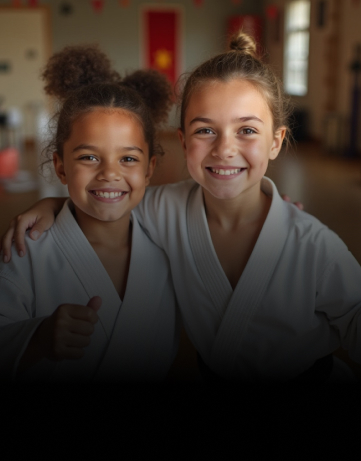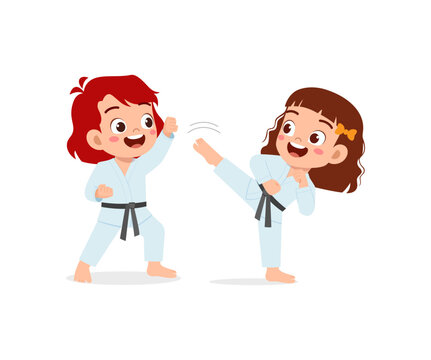Exactly How Martial Arts for Children Can Boost Confidence and Discipline in Young Martial Artists
Karate for children uses an unique chance to construct self-confidence and discipline in young martial artists. As they learn new techniques and face difficulties, they not just gain abilities but likewise establish a strong sense of self-worth. This structured environment encourages them to value the trip of renovation. How does this training translate into their everyday lives? Discover the much deeper links that make karate even more than simply a sport.
The Significance of Confidence in Childhood Growth
Self-confidence is a necessary structure block in childhood years advancement. When you nurture your kid's self-esteem, you encourage them to face challenges, take risks, and share themselves openly. Youngsters with self-confidence are extra ready to explore new activities and social circumstances, which can cause lasting friendships and beneficial experiences.Encouraging your youngster to get out of their convenience zone promotes resilience. They discover that failing isn't completion but rather a tipping rock to success. By celebrating their accomplishments, regardless of how little, you assist them identify their abilities and worth.In this journey, assistance and favorable support from you play an important function. Whether it's via appreciation or merely being present, your involvement boosts their confidence. As they grow, this confidence comes to be a long-lasting property, equipping them to navigate both difficulties and chances with a solid feeling of self.
Just How Martial Arts Teaches Self-control and Emphasis
Martial arts assists you construct discipline and focus through its structured training regimen. As you practice mindfulness during each session, you'll learn to concentrate much better both on and off the floor covering. And also, establishing and accomplishing objectives in martial arts enhances your capacity to remain fully commited and conscientious.
Structured Training Regimen
While you engage in karate training, you'll quickly discover exactly how an organized routine infuses technique and emphasis in young specialists. Each course adheres to a specific style, consisting of workouts, method method, and sparring. This uniformity shows you to value the procedure and devote to improvement. As you discover methods and kinds, you establish a feeling of duty for your very own progress.The organized setting urges you to establish objectives, whether understanding a brand-new belt or perfecting a kata. You'll discover that staying focused during drills and courses develops your focus. The self-control you cultivate in martial arts extends past the dojo, favorably impacting your schoolwork and day-to-day regimens. Each session reinforces the relevance of commitment, helping you expand into a more disciplined individual.
Mindfulness in Technique
As you practice martial arts, you'll discover that mindfulness comes to be a crucial part of your training. Each move needs your full focus, helping you remain concentrated on the existing moment. You'll find out to tune out disturbances and focus on your breathing, activities, and objectives. This enhanced understanding develops your reflexes and enhances your discipline.During sparring or kinds, you'll discover the value of being mentally existing - Karate Salisbury MD. You'll notice exactly how this focus not just boosts your method yet also constructs your confidence. By exercising mindfulness in karate, you cultivate perseverance and resilience, essential traits that prolong beyond the dojo. This way, martial arts instructs you to harness your mind, aiding you establish a disciplined strategy to difficulties both on and off the floor covering

Personal Goal Setting Techniques
Establishing objectives in karate isn't just regarding making belts; it's an effective way to cultivate technique and emphasis. When you set certain, possible targets, you develop a roadmap for your progress. As an example, rather than simply aiming to boost your kicks, try concentrating on grasping a certain strategy each month. This technique maintains you determined and engaged.Breaking down larger goals right into smaller sized, convenient steps aids you track your progress and celebrate small victories in the process. Whether it's perfecting your position or enhancing your sparring endurance, every goal reinforces your commitment. As you attain these objectives, you'll construct self-confidence in your abilities and create a solid sense of discipline that extends beyond the dojo right into day-to-day life.
Building Resilience Via Martial Arts
Fighting style, particularly martial arts, uses youngsters a distinct opportunity to construct strength in a helpful atmosphere. In courses, they encounter challenges that press their limits, whether it's understanding a brand-new technique or competing with a partner. Each obstacle, like a missed out on kick or a lost suit, becomes a possibility to learn and grow.As they practice, children learn to accept pain and maintain trying, also when points get difficult. They uncover that failure isn't the end; it's component of the trip. This attitude helps them recuperate more powerful, not simply in the dojo, but in everyday life.With each difficulty they get over, your child develops self-confidence in their capacity to tackle challenges, sustaining their resolution. Through karate, they'll comprehend that strength isn't practically physical strength; it has to do with psychological grit and willpower, empowering them to face whatever life throws their method.
The Duty of Regard in Martial Arts Educating
Regard is a foundational principle in karate training, promoting a society of technique and sociability amongst pupils. When you tip onto the dojo flooring, you're not simply finding out strategies; you're additionally finding out to respect your trainers, peers, and the art itself (Karate Salisbury MD). Bowing at the start and end of course isn't simply a rule; it represents your recommendation of others' dedication.as and initiatives you create shared regard, you'll discover it improves your discovering experience. You'll pay attention a lot more attentively to your trainer and gain insights from fellow students. This environment encourages constructive objection and assistance, enabling everybody to grow together.Moreover, respect grows self-discipline. Recognizing the value of difficult work and humbleness aids you remain focused on your training. Consequently, this respect translates right into your day-to-day life, enhancing your communications and partnerships outside the dojo. Through martial arts, you find out that regard is essential for personal development and area structure
Accomplishing and establishing objectives Success in Karate

Social Abilities and Teamwork in the Dojo
While training in the dojo, youngsters normally create vital social abilities and synergy abilities. As they practice together with peers, they find out to communicate efficiently, share area, and assistance one another. Each class provides possibilities for collaboration, whether it's during partner drills or group exercises. This team effort cultivates relationships and creates a sense of belonging, making the dojo a nurturing environment.Kids likewise get beneficial conflict resolution skills. When they experience difficulties, such as differences throughout sparring, they find out to browse these situations constructively. They practice patience and empathy, comprehending that everybody has various staminas and weaknesses.Moreover, joining group activities grows a feeling of responsibility. You'll see your youngster finding out to depend on colleagues and take duty for their role in a group. These experiences not only boost their fighting styles journey but likewise furnish them with social tools they'll carry into other areas of life.

The Long-Term Advantages of Martial Arts Beyond Childhood Years
As children mature and move into adulthood, the advantages of martial arts prolong far past the dojo. You'll discover that the discipline and focus learned via martial arts can convert right into your professional and scholastic life. Establishing and accomplishing goals in martial arts fosters a solid job ethic, which can push you to succeed in any kind of endeavor.Moreover, the self-confidence got from grasping methods and sparring can improve your self-confidence, helping you tackle obstacles head-on. This durability becomes invaluable as you encounter the uncertainties of adulthood.Additionally, the social abilities created via team effort and friendship in the dojo can result in better connections in both specialist and personal rounds. You'll discover to communicate properly, willpower conflicts, and develop a supportive network.Ultimately, karate forms not just experienced martial musicians, however well-rounded people all set to take on the globe.
Regularly Asked Questions
What Age Is Finest to Beginning Martial Arts for Kids?
You can start martial arts as very early as age 4 or five, but it often depends upon your youngster's maturation and interest. Finding a class that suits their age and energy level makes a huge distinction.
Exist Any Health Perks From Exercising Martial Arts?
Yes, exercising karate deals numerous health benefits. You'll improve click here your toughness, coordination, and flexibility while improving cardio health and fitness. And also, it boosts emphasis and mental wellness, making it an amazing option for general physical and mental health.
How Often Should Kids Participate In Martial Arts Courses?
You must motivate your kids to attend karate courses a minimum of a couple of times a week. Consistency helps them find out methods successfully and establish skills, making their experience extra satisfying and gratifying over time.
Can Karate Assist With Taking Care Of Stress And Anxiety in Children?
Yes, karate can aid handle anxiety in youngsters. It shows focus and self-discipline while offering a safe electrical outlet for energy. You'll see your kid growing more calm and positive as they practice routinely.
What Equipment Is Needed for Children Beginning Karate?
